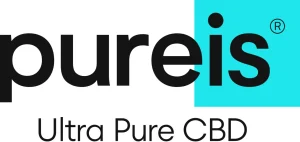
Read time: 4 minutes
The Difference Between CBD Vs. THC
What is the difference between CBD Vs. THC
They’re both chemical compounds that are extracted from the cannabis plant – and both are internationally hugely popular, with a growing consumer-base swearing by them. So what’s the difference between CBD vs. THC?
What is CBD?
CBD (short for cannabidiol), is an active chemical compound found in the cannabis sativa plant, which is also known as ‘marijuana’ or ‘hemp’. It’s one of potentially hundreds of cannabinoids present in the plant, but unlike others, CBD doesn’t produce the psychotropic effects that the other prevalent compound, THC (tetrahydrocannabinol) does.
This is because it doesn’t bind to cannabinoid receptors in the brain and works with the endocannabinoid system to move the body towards homeostasis – a state of balance throughout the body. This also means CBD doesn’t get the user ‘high’ and doesn’t leave them with affected cognition. What’s more, CBD is being researched for its many potential therapeutic properties.1
What is THC?
THC is the other main compound found in cannabis, but where CBD seems to have very few side effects,1 THC is responsible for the psychoactive effects that cannabis is well known for. When THC is taken, it binds to cannabinoid receptors CB1 and CB2 in the brain, producing the feeling of euphoria.2 It can also produce effects such as altered sensory perception, impaired memory and concentration and changes in mood. THC is often used for recreational purposes, but despite this, it may also have potential health benefits too. However, using THC can have negative side effects, including impaired judgement and coordination, increased heart rate, and potential risks to mental health.3
What’s the difference between CBD and THC?
- Where do THC and CBD come from?
Both THC and CBD are present in cannabis sativa, a flowering plant originally from Asia but now grown all over the world.4 The flower, leaves, and stems of the plant contain more than 100 distinct cannabinoids, and most prevalent are THC and CBD. Different strains of cannabis have varying amounts of THC and CBD and while certain strains may be heavy in THC and low in CBD, others can be the opposite. Cannabis strains with a high THC content are typically used mainly for their euphoric effects, whereas strains with a high CBD content are typically taken for their possible health benefits.5
- Do both have an effect on the brain?
THC and CBD both have an impact on the brain. THC is famous for its psychoactive qualities, which cause other effects, like altered sensory perception, poor memory and focus, as well as mood disturbances. This is in addition to several health advantages, but these are almost always accompanied by a ‘high’.
On the other hand, CBD doesn’t have psychedelic effects but does still have an effect on the brain. According to several studies, CBD’s interactions with the brain could be an advantage in treating illnesses like anxiety,6 depression,7 and epilepsy.8 Additionally, studies are being conducted to see if it could be used to treat Parkinson’s and Alzheimer’s disease.9 Additionally, it seems to have an impact on neurogenesis and neuroplasticity,10 two factors which are crucial for maintaining brain health.
- What can CBD and THC be used for?
Despite its reputation for intoxication, THC has still been legalised in a number of countries, primarily because of its health applications, which appear to include helping with pain management,11 reduced inflammation,12 neurological and mental disorders13 and sleep management.14 However, these can potentially be accompanied by the psychoactive effects which can include hallucinations, over-stimulation, anxiety and depressant like effects.15
CBD on the other hand is being researched for a wide variety of conditions, some of which we’ve already explored, but also including (but not limited to) anxiety,16 chronic pain and discomfort,17 insomnia,18 heart health,19 depression20 and more.
- CBD vs THC for anxiety
When it comes to conditions like anxiety, CBD is likely the better option to take, as the ‘high’ from THC can actually induce anxiety and make the user stressed.15
How can CBD and THC be taken?
Both CBD and THC can be taken in a number of ways.
CBD oil:
THC and CBD can both be taken in the form of oils and tinctures, typically taken by placing a few drops sublingually, or under the tongue. This method allows the compounds to be absorbed through mucous membranes in the mouth and into the bloodstream quickly.
Capsules and edibles:
THC and CBD can be taken in capsule form and also added to food and beverages in edible form and this process enables the compounds to enter the bloodstream and pass through the digestive system. This often means they will take longer to take action but their effects may also persist for longer.
Sprays:
Depending on where you live, it’s possible to purchase THC and CBD in spray form, to be taken nasally or orally. These sprays have a rapid onset of action because they directly reach the bloodstream after being absorbed by the mucous membranes in the nose.
Topical products:
Some people use THC and CBD in the form of creams, lotions, and ointments applied to the skin. This allows the compounds to be absorbed through the skin and into the bloodstream, but they are unlikely to produce psychoactive effects because they don’t enter the bloodstream in a large enough quantity.
Vaping:
Using an e-cigarette or a vaporizer, THC and CBD can be taken in vapour form via the lungs. By using this technique, the substances are inhaled and absorbed through the lungs. Not much is yet known about the effect of vaping on the lungs, so many people are cautious about this method.
Smoking:
THC and CBD are both ingested when cannabis is smoked. This method allows the compounds to be absorbed through the lungs and into the bloodstream quickly, but carries with it all the usual risks of smoking.
Legal Status: CBD vs. THC
The legal status of both CBD and THC varies from country to country. In the UK, THC remains a controlled substance and this is primarily because of its psychoactive effects. In contrast, CBD has been legal for sale in the UK since 201821 and more thoroughly regulated since 2019. Whilst this is the case in the UK, many states in the USA have legalised THC and cannabis itself as a product.22
A summary of the main CBD and THC differences
Now that we’ve explored the major THC vs CBD differences, let’s briefly sum up:
Where do they come from?
Both CBD and THC are derived from the cannabis sativa plant.
What effect do THC and CBD have on the user?
Whilst it’s legal to take in some countries due to its potential health benefits, THC also commonly causes users to become high, and this can have adverse effects, such as nausea, hallucinations and anxiety.
CBD also has a wide variety of potential health benefits, but even in large quantities it doesn’t get the user ‘high’.
What can CBD and THC be used for?
THC in a medical context has been used for pain management, reduced inflammation, neurological and mental disorders and sleep management – but it’s arguable that most users take THC recreationally.
CBD appears to have a multitude of applications for health benefits and these include anxiety, chronic pain and discomfort, insomnia, heart health, depression, heart health and more.
How are CBD and THC taken
THC is often smoked, but there is a growing market (depending on your country) for both THC and CBD products including oils, oral and nasal sprays, edibles, capsules, creams and balms.
Are CBD and THC legal?
Legality in both cases depends entirely on a specific country’s laws surrounding cannabis. In the USA, a growing number of states have legalised cannabis as an entity entirely, whereas in the UK, CBD is only legal if the THC content is marginal – below 0.2%.
Pureis is a food supplement, not intended to treat or prevent any physiological or psychological disease.
- Your Guide to CBD – healthline.com
- The Effects of Marijuana on Your Body – healthline.com
- What Are the Benefits of Marijuana? – Risks – healthline.com
- History of Cannabis | Cannabis Research Initiative – ucla.edu
- High-CBD Strains for Anxiety: 12 to Consider – healthline.com
- Anxiolytic Effects of Repeated Cannabidiol Treatment in Teenagers With Social Anxiety Disorders – frontiersin.org
- CBD for Depression: What Are the Benefits? – healthline.com
- The Pharmacological Basis of Cannabis Therapy for Epilepsy – aspetjournals.org
- Targeted THC and CBD Phytocannabinoids as Potential Therapeutics for Parkinson’s and Alzheimer’s Diseases – SpringerLink
- Cannabidiol, neuroprotection and neuropsychiatric disorders – PubMed
- Role of Cannabinoids in Pain Management – SpringerLink
- Anti‐inflammatory activity of topical THC – Wiley Online Library
- Cannabinoids for the treatment of mental disorders and symptoms of mental disorders – ScienceDirect
- Cannabinoids in the Treatment of Insomnia Disorder – SpringerLink
- What Is Cannabis? Facts About Its Components, Effects, and Hazards – healthline.com
- CBD Oil for Anxiety: Research, Dosage, Side Effects & More – healthline.com
- The Role of Cannabidiol (CBD) in Chronic Pain Management – SpringerLink
- CBD for Insomnia: Can It Help? – healthline.com
- A single dose of cannabidiol reduces blood pressure in healthy volunteers – PMC
- CBD for Depression: What Are the Benefits? – healthline.com
- Cannabis, CBD and other cannabinoids: drug licensing factsheet – GOV.UK
- States Where Marijuana Is Legal in 2022 – CFAH

